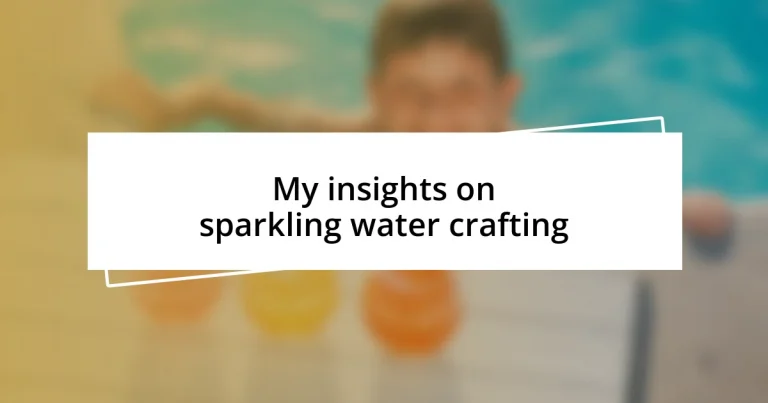Key takeaways:
- Sparkling water offers a unique taste experience and can aid in digestion and hydration, with various types available, such as seltzer and tonic.
- The crafting process involves careful water selection, filtration, carbonation techniques, and flavoring, emphasizing quality ingredients.
- Serving sparkling water can become a celebratory event, enhanced by creative presentation, garnishes, and personal touches that create memorable moments.

Understanding Sparkling Water
Sparkling water, often distilled from mineral springs, is more than just a bubbly alternative to still water; it carries with it the essence of the earth’s natural purity. I still remember the first time I took a sip of a naturally carbonated Italian mineral water on vacation. The effervescence just danced on my tongue, and suddenly, I understood the appeal—it was refreshing, lively, and incredibly different from what I was used to.
Have you ever considered the different types of sparkling water? From seltzer to tonic, each variety has its own unique character and flavor profile. This distinction reminds me of the first time I hosted a gathering and served various kinds. I watched my friends experiment with flavors and textures, sparking conversations about their preferences, which made me realize how a simple drink could open doors to connections and shared experiences.
What fascinates me the most is the nutritional aspect of sparkling water. While it’s often perceived as just a treat, I’ve learned that it can actually aid digestion and hydration. I recall a day when I felt sluggish after a big meal and a glass of sparkling water perked me right up. Isn’t it interesting how such a delightful drink can elevate both our mood and our health?

The Crafting Process Overview
The crafting process of sparkling water is a fascinating mix of science and artistry. From the initial selection of water to the carbonation method, every step plays a crucial role in the final product. I recall a particularly eye-opening experience when I visited a local sparkling water producer. Watching the meticulous filtration process and carbonation infusion felt like witnessing a delicate dance, each movement intentional and precise.
Here’s a breakdown of the essential steps involved in crafting sparkling water:
– Water Selection: Choosing the right source is vital; mineral content can affect taste and health benefits.
– Filtration: Ensuring purity to remove any impurities while retaining essential minerals.
– Carbonation: Introducing carbon dioxide, which can be done naturally or through forced carbonation; each method impacts the final fizz.
– Flavoring (if desired): Adding natural flavors enhances the drinking experience and can create a more personalized touch.
In my journey to experiment with home crafting, I realized that even a subtle difference in carbonation levels changes the mouthfeel and overall enjoyment. Each sip reveals the complexity behind something that appears so simple—this hands-on experience truly deepened my appreciation for sparkling water.

Selecting Quality Ingredients
When it comes to selecting quality ingredients for crafting sparkling water, the base water is paramount. I’ve tasted the difference between plain tap water and natural spring water, and let me tell you, it’s like night and day. During one experiment, I used a local mineral water known for its unique taste, and it transformed an ordinary batch into something special — bright, lively, and full of character.
Beyond water, flavoring can elevate your sparkling water to new heights. I often find myself in the local farmers’ market searching for seasonal fruits and herbs. The first time I tried adding fresh mint and crushed strawberries to my sparkling water, I was amazed at how refreshing it was — like sipping on summer itself. Quality ingredients not only enhance flavor but also provide a personal touch to your creations.
Lastly, don’t overlook any additives. There are some products that claim to enhance taste or health, but I’ve learned to be critical of these options. During my exploration of naturally flavored sparkling waters, I realized how important it is to prioritize organic and non-GMO ingredients. Trust me; when you use high-quality, all-natural ingredients, the flavor transformation is delightful.
| Ingredient | Quality Indicator |
|---|---|
| Water Source | Natural spring or mineral content |
| Flavor Additives | Organic and fresh ingredients |
| Carbonation Method | Natural carbonation preferred |
| Sweeteners | Non-GMO, low-calorie options |

Carbonation Techniques Explained
Carbonation is truly the magic that transforms still water into sparkling delight. I’ve had some captivating moments experimenting with different carbonation techniques. The first time I tried forced carbonation at home using a soda maker, I was thrilled to see how quickly CO2 infused the water. It felt like a science experiment, watching those tiny bubbles dance and rise. I can tell you, the fizz from a soda maker gives an immediate burst of clarity to the flavor.
On the other hand, natural carbonation, which occurs through fermentation, brings a different kind of complexity. I remember a time when I brewed a batch of my own sparkling water using a kombucha base. The bubbling was more subdued, but it added a subtle tanginess that turned into a delightful experience. Have you ever tried something that took you by surprise? That little twist in the flavors felt like a secret I had just unlocked. It made me appreciate the depth that a slower carbonation method can bring to the final taste.
In my exploration, one insight that stands out is how important the carbonation level is to the overall experience. Whether it’s the sharp, invigorating bubbles from forced carbonation or the gentle effervescence from natural methods, each offers a unique sensation. I always ask myself, how do I want my sparkling water to feel? That intention shapes how I craft each batch, ensuring that I create an experience that’s not just about thirst quenching; it’s about enjoyment and discovery.

Flavoring Options and Combinations
Flavoring sparkling water is truly a creative endeavor. I remember a delightful afternoon when I mixed zesty lime juice with a handful of crushed basil leaves. The fragrance was captivating, and the combination was electric—refreshing yet aromatic. It’s fascinating how just a couple of ingredients can completely transform the experience. Have you ever considered how certain flavors can evoke memories?
One of my favorite combos is pairing watermelon with a splash of coconut water. I stumbled upon this during a hot summer day when I desperately needed hydration. The result was a tropical escape in a glass, turning my dull day into a mini-vacation. Such vibrant combinations not only tantalize the taste buds but also provide a visual treat. The bright pink coloration, contrasted with the effervescence of the bubbles, really makes a difference.
Don’t shy away from exploring unique flavor pairings! I once experimented with roasted peaches and rosemary, thinking it might be too unusual, but it turned out to be a revelation. The caramelized sweetness of the peaches blended perfectly with the earthy notes of rosemary. Who knew that a stove could give new life to my sparkling water? These unexpected combinations may just lead you to your new favorite drink—so why not try something out of the ordinary?

Bottling and Storage Tips
When it comes to bottling your sparkling water, I’ve learned that the choice of bottles can make a significant difference. Glass bottles not only preserve carbonation better than plastic, but they also add a touch of elegance to the experience. Imagine cracking open a chilled glass bottle on a warm day—there’s something gratifying about that sound, isn’t there?
Storage is equally important; I always store my bottled sparkling water upright in a cool, dark place. This helps maintain the effervescence while preventing leaks or contamination from other flavors in the fridge. Have you ever opened a bottle only to find it flat? Trust me, a little attention to how you store your bottles can go a long way in ensuring that you experience that delightful fizz every time.
Lastly, I recommend labeling your bottles with the date and flavor combination. This simple practice not only helps you keep track of freshness but also allows you to note which blends you loved most. Looking back at my old labels, I can’t help but smile, remembering those fun flavor experiments. It turns into a mini diary of my sparkling water journey, and you may be surprised at how fun it is to explore variations over time. What flavors are you excited to try next?

Serving and Enjoying Sparkling Water
When I serve sparkling water, I love to make it a mini-event. I’ll often grab a beautiful glass pitcher and fill it with ice, fresh fruit, and herbs before adding the sparkling water. Just the act of pouring it out into individual glasses brings a certain joy – it’s like a small celebration each time. Have you ever noticed how the sound of bubbles makes people smile? There’s just something magical about it.
I also enjoy experimenting with garnishes. One of my go-to tricks is to rim the glass with a bit of sugar and a hint of lime zest. It adds that lovely touch of sweetness before you even take a sip. Once, I served this concoction at a small gathering, and my friends were intrigued. They loved the visual aspect and the surprising depth of flavor it brought. It’s incredible how presentation can enhance the experience, making it feel special.
Serving sparkling water is more than just hydration; it’s an opportunity to create memorable moments. I can still recall a cozy evening when I crafted a rose-infused sparkling water for an intimate dinner. My guests were curious, and their delight at the subtle floral notes made the night feel extraordinary. Isn’t it fascinating how a simple drink can become a conversation starter? What special touches do you add when sharing your beverages with others?














